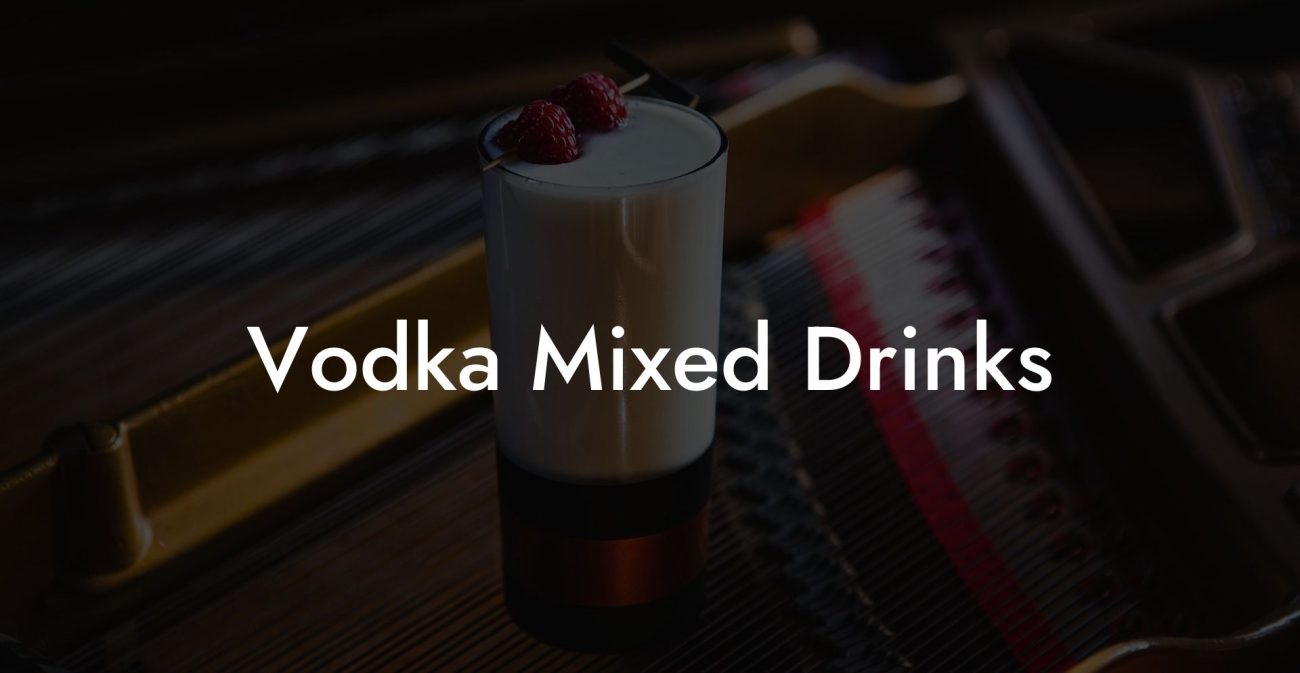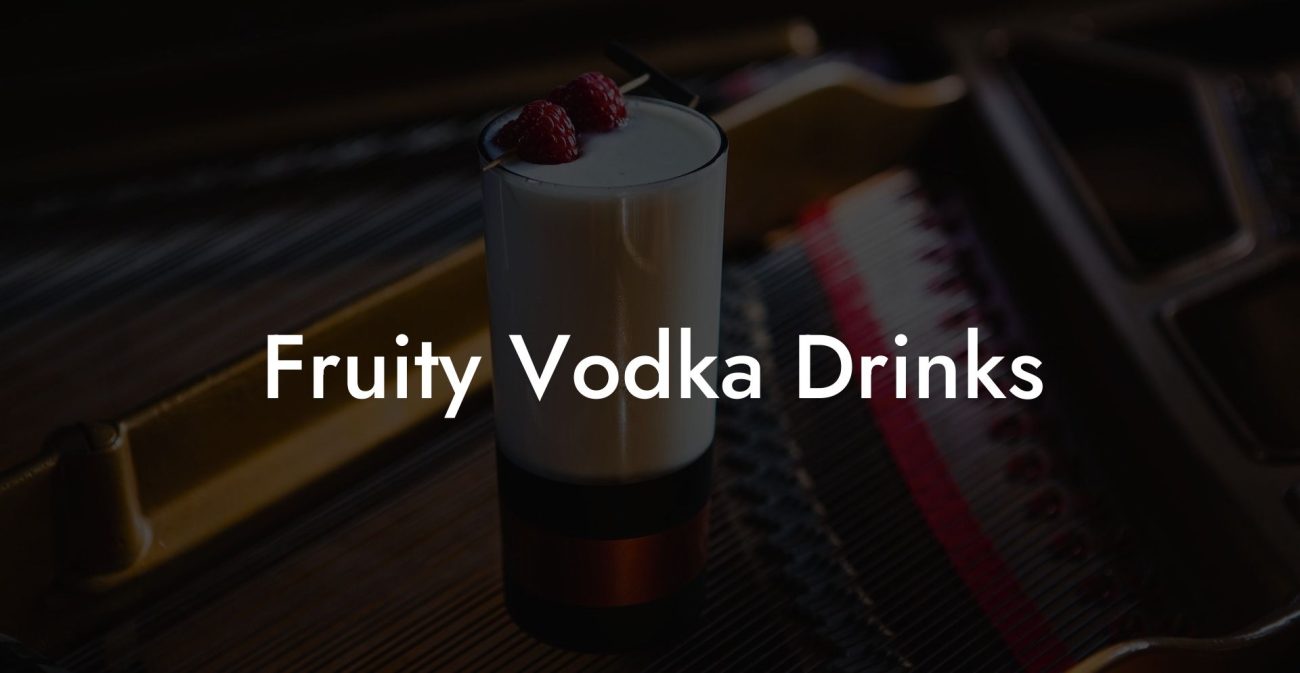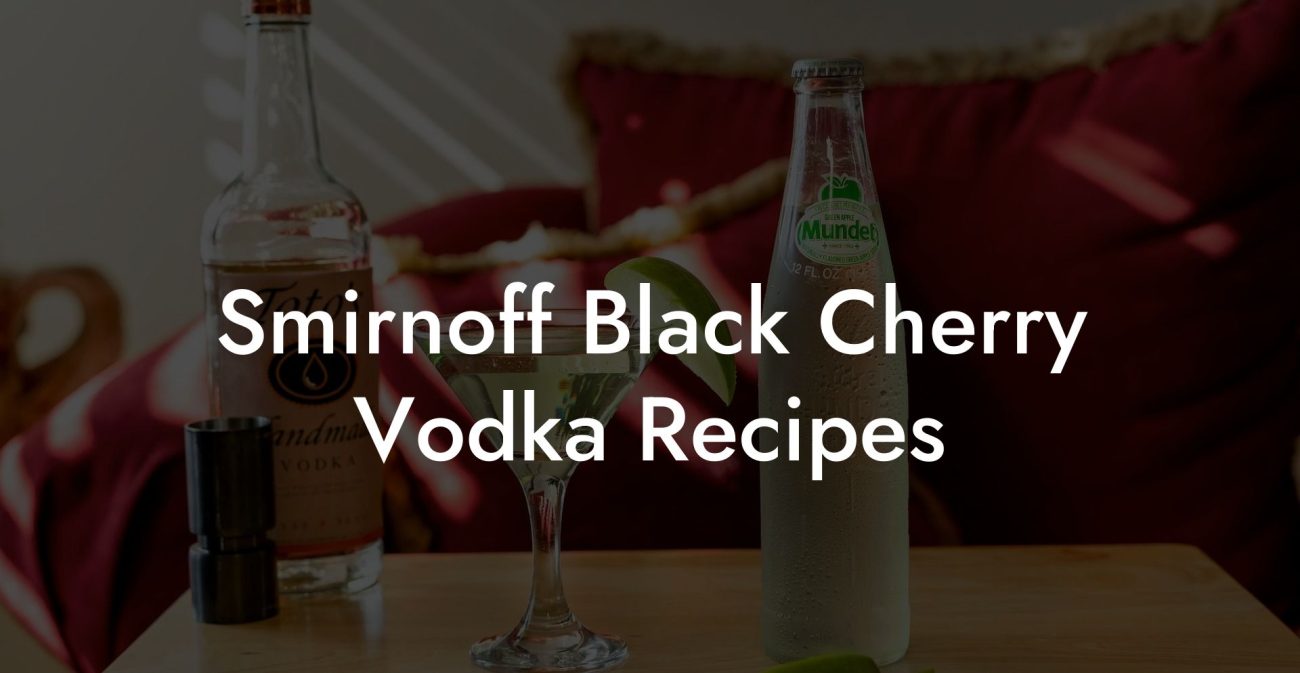Picture this: it’s a warm summer evening, you’re hanging out with your best buds, and someone shouts, “Vodka cocktails, anyone?” Instantly, the room fills with the buzz of anticipation and creative energy, because nothing says “let’s get this party started” quite like a well-crafted vodka cocktail. Whether you’re a seasoned home bartender or a Gen Z novice ready to shake, stir, and sip your way to cocktail mastery, this guide is your golden ticket into the vibrant world of vodka mixology. Get ready for a journey that’s equal parts fun, flavor, and a few cheeky surprises along the way!
Vodka Cocktails Recipe Table of Contents
The Origins and Evolution of Vodka Cocktails
The Foundation of an Epic Vodka Cocktail
Classic Vodka Cocktails You Need to Know
Trendsetting Vodka Cocktails for the Modern Palate
DIY Mixology: Crafting Your Signature Vodka Creation
How to Choose the Perfect Vodka
Infusing Vodka: A Trendy Twist for the Creative Home Bartender
Mixology Tricks and Techniques Every Vodka Enthusiast Should Know
Pairing Vodka Cocktails with the Perfect Snacks
The Culture of Vodka Cocktails: A Social and Creative Movement
Seasonal Vodka Cocktails: Crafting Drinks for Every Occasion
Resources and Community Support: Your Next Steps
Vodka Cocktails Around the World: Global Inspirations
Health and Wellness: Balancing Fun and Responsibility
Vodka Cocktail Pairing: Curating the Ultimate Party Experience
Experimenting with Presentation: Serving Your Cocktails in Style
Cocktail Pairing with Music: Set the Vibe
FAQ: Vodka Cocktails Recipe Essentials
Your Invitation to Explore the World of Vodka Cocktails
Looking For The Best Vodka? You'll Love These Vodka Guides...
The Origins and Evolution of Vodka Cocktails
Vodka’s history is as clear as the spirit itself. While its origins are often traced back to Eastern Europe and Russia, vodka has traveled the globe, adapting to cultures and innovating endlessly along the way. Originally enjoyed neat, this versatile libation has evolved into the star of countless cocktails—from the fiery Moscow Mule to the sleek elegance of a Vodka Martini.
In the early days, vodka was seen as a no-frills drink, but over time, creative mixologists began experimenting with different mixers and garnishes, transforming it into a cocktail canvas. Today’s vodka cocktails are not only about getting the party started but also about expressing personality and style. Millennials and Gen Z are especially drawn to these creative concoctions, thriving on novelty and bold flavors that reflect their unique tastes.
So, whether you’re drawn to the classics or eager to try something avant-garde, prepare to dive deep into the art and science behind the perfect vodka cocktail. Because let’s be real: life’s too short for boring drinks!
The Foundation of an Epic Vodka Cocktail
Every great cocktail starts with the perfect foundation. At its heart is the vodka—the spirit that is renowned for its clean, crisp taste and almost blank flavor canvas. But don’t be fooled by its simplicity: the magic happens when you pair it with the right mixers, garnishes, and a splash of creativity.
Here’s what makes a vodka cocktail shine:
Best Budget Vodkas Ranked
- Quality Vodka: Whether you go for a well-known brand or a small-batch artisanal spirit, the quality of your vodka is the starting point of your cocktail’s flavor profile. It should be smooth, versatile, and ready to mingle with any other ingredient.
- Mouth-Watering Mixers: From citrus juices and tonic water to creative infusions like cucumber or basil, mixers add the burst of flavor that brings your cocktail to life.
- Sassy Sweeteners: A little sweetness can go a long way—think simple syrup, flavored liqueurs, or even a drizzle of honey to balance the acidity and intensity.
- Bold Bitters and Spices: A dash of bitters, a pinch of salt, or even a twist of lemon zest can elevate your drink from ordinary to extraordinary.
- Garnishes That Wow: A well-placed garnish not only adds visual flair but can also enhance the aroma and taste of your cocktail. Fresh herbs, fruit slices, or even edible glitter are all fair game.
Mastering your vodka cocktail is all about balancing these elements to create a drink that’s refreshing, exciting, and oh-so-satisfying.
Classic Vodka Cocktails You Need to Know
Let’s address the elephant in the room: classics never go out of style. Even in the fast-paced world of trendy cocktails, the foundation of great mixology is often built on time-tested recipes. Here are a few classics that have stood the test of time:
The Vodka Martini
A drink synonymous with James Bond (shaken, not stirred, of course), the Vodka Martini is the epitome of elegance. Combining vodka with a hint of dry vermouth and finished off with a lemon twist or olive, this cocktail is all about minimalism done right. It’s sophisticated, bold, and the perfect choice when you want to exude a sense of cool detachment.
Moscow Mule
Served in a quirky copper mug, the Moscow Mule is a refreshing explosion of flavors. Mix vodka with ginger beer, a squeeze of lime juice, and a touch of mint for garnish, and you have a cocktail that’s spicy, tangy, and irresistibly refreshing—a true crowd-pleaser, especially during those sweltering summer nights.
Screwdriver
If life ever feels too complicated, simply reach for a Screwdriver. This no-fuss cocktail combines vodka with fresh orange juice, creating a drink that’s as simple as it is satisfying. It’s a classic brunch favorite that can effortlessly transition from a lazy Sunday morning to an impromptu poolside party.
Cosmopolitan
Thanks to pop culture and its iconic presence in countless television shows, the Cosmopolitan has become a go-to cocktail for those looking to add a touch of glamour to their evening. A mix of vodka, cranberry juice, triple sec, and a dash of lime, the Cosmopolitan is the ultimate blend of sweet and tart—perfect for those nights when you just want to feel a little extra.
These classic cocktails offer a solid base from which to develop your own customized vodka concoctions. After all, there’s always room for a little twist on a timeless favorite!
Trendsetting Vodka Cocktails for the Modern Palate
Millennials and Gen Z are rewriting the cocktail playbook. No longer content with the standard fare, these trendsetters crave creativity and authenticity in every sip. Here are some innovative vodka cocktails that are shaking up the scene:
The Lavender Lemonade Vodka Fizz
Imagine the calming aroma of lavender fused with zesty lemon freshness, all boosted by the crisp bite of vodka. This cocktail is perfect for brunches, lazy afternoons, or even as a pre-dinner aperitif. Start by infusing vodka with a hint of lavender, then mix it with fresh lemonade and a splash of club soda. Garnish with a sprig of lavender and a lemon wheel, and let your taste buds dance.
The Spicy Mango Mule
For those who crave adventure in a glass, the Spicy Mango Mule is your passport to flavor town. Blend the tropical sweetness of mango with a kick of jalapeño-spiked vodka and finish with ginger beer and lime juice for a fizzy, fiery delight. Don’t forget a slice of fresh mango and a dash of chili powder to complete this visual and gastronomic spectacle.
The Cucumber Basil Bliss
Keeping it cool and crisp, this cocktail is as refreshing as a summer breeze. Muddle fresh cucumber slices with basil leaves, mix with premium vodka, and add a splash of elderflower tonic. The result? A cocktail that’s light, aromatic, and perfect for sipping during a backyard barbecue or an upscale soirée.
The Berry Infused Ice Smash
This cocktail is a hit at parties and is practically a festival in a glass. Begin by freezing a mix of your favorite berries along with a touch of simple syrup. Blend these frozen delights with vodka and a squeeze of lemon juice, and garnish with a few whole berries and a mint sprig. The result is a slushy, tangy, and utterly refreshing drink that screams summer fun.
These trendsetting recipes embrace bold flavors and playful presentations, reflecting the adventurous spirit of today’s cocktail enthusiasts. They encourage you to experiment, mix ingredients like a science wizard, and turn every gathering into a mini celebration of taste and style.
DIY Mixology: Crafting Your Signature Vodka Creation
Now that you’ve navigated through the iconic and innovative vodka cocktails on offer, it’s time to don your apron and get hands-on with some DIY mixology. Crafting your signature vodka cocktail is not just about following a recipe—it’s about channeling your inner artist, embracing spontaneity, and letting your imagination run wild.
Step 1: Stock Your Bar Like a Pro
Begin by gathering your essential ingredients. Beyond your go-to vodka, consider stocking up on a variety of mixers (think citrus juices, tonic water, club soda, and ginger beer), bitters, fresh herbs, fruits, and even some edible décor like fresh flower petals or colorful straws. A well-equipped bar is the cornerstone of every home mixologist’s arsenal.
Step 2: Experiment with Flavor Pairings
The world of flavor combinations is vast and exciting. One minute you might be pairing basil with cucumber for a refreshing twist, and the next you’re mixing spicy jalapeño with sweet mango. Don’t be afraid to experiment—after all, some of the best cocktails have come from happy accidents and bold flavor explorations.
Step 3: Embrace the Technique
Whether you prefer shaking, stirring, or blending, mastering the technique is key. Each method brings out different textures and intensities in your drink. For example, shaking with ice can incorporate air for a frothy finish, while stirring might give you a smoother, more uniform blend. Experiment and see which technique best highlights your flavor combo.
Step 4: Garnish Like You Mean It
Garnishes are not just for show—they’re the final flourish that ties the whole cocktail together. Experiment with twists of citrus peel, sprigs of mint or basil, berries, or even custom edible flowers. The right garnish can add an aromatic dimension to your cocktail and make it look as good as it tastes.
Remember, every great cocktail is a blend of art and science. With your creativity, a bit of experimentation, and a few well-stocked ingredients, you’re all set to craft a signature vodka cocktail that’ll have your friends asking for your secret recipe.
How to Choose the Perfect Vodka
When it comes to vodka cocktails, not all vodkas are created equal. The spirit you choose can make or break your cocktail experience. Here are some tips to help you navigate the plethora of choices available:
- Purity Is Key: Look for vodkas that boast smoothness and clarity—qualities that ensure they don't overpower your mixers. Premium brands often undergo multiple distillations and filtrations, resulting in a purer taste.
- Flavor Infusions: Nowadays, flavored vodkas are all the rage. From citrus and berry to more exotic infusions like pepper or cucumber, these can add a unique twist to your cocktails. Just ensure the flavor complements rather than competes with the other ingredients.
- Budget vs. Splurge: While premium vodkas can elevate your cocktail experience, don’t count out mid-range options that offer great taste without breaking the bank. After all, great cocktails are more about creativity and balance than expensive ingredients.
- Local Craft Options: Keep an eye out for local and craft vodkas. Many small distilleries offer unique flavor profiles that you might not find in bigger brands, adding a personal touch to your homemade beverages.
The right vodka should be a smooth operator—enhancing your cocktail without stealing the spotlight. Trust your palate, and don’t be afraid to experiment with different brands until you find the perfect match for your mixology adventures.
Infusing Vodka: A Trendy Twist for the Creative Home Bartender
One of the coolest trends in the modern home bar scene is infusing vodka with fresh ingredients. This isn’t just for hipsters—it's a fantastic way to tailor the spirit to your personal taste and create a unique base for your cocktails.
Start simple: choose your favorite fruits, herbs, or even spices, and add them to a bottle of vodka. Some popular infusion ideas include:
- Citrus Burst: Combine slices of lemon, lime, and orange for a refreshing, zesty twist that brightens up any cocktail.
- Berry Medley: Fresh or frozen berries can impart a subtle sweetness and a splash of color, perfect for summer sippers.
- Herbal Harmony: Mint, basil, or rosemary can add an aromatic complexity to the spirit, ideal for sophisticated cocktail experiments.
- Spicy Surprise: For those who like a bit of kick, a few slices of jalapeño or a pinch of chili can introduce a delightful heat.
Seal your bottle, let it sit in the fridge or at room temperature for a couple of days, and voilà—you’ve got a customized cocktail base that brings your homemade drinks to a whole new level.
Mixology Tricks and Techniques Every Vodka Enthusiast Should Know
Whether you’re shaking up a classic Moscow Mule or creating an entirely new concoction, a few mixology tricks can help you elevate your cocktail game to legendary status.
The Art of Shaking vs. Stirring
Understanding when to shake and when to stir is a craft in itself. Shaking adds air and creates a frothy, textured finish—perfect for cocktails with citrus or creamy ingredients. Stirring, on the other hand, gently combines the ingredients while preserving clarity and silky smoothness. Experiment with both methods to see how each technique transforms your cocktail’s character.
Temperature Is Everything
A well-chilled cocktail can make all the difference. Always use plenty of ice, and if possible, pre-chill your glassware. A cold drink not only tastes better but also helps maintain the perfect balance of flavor and dilution.
The Perfect Garnish
Garnishing isn’t just about aesthetics—it can also subtly boost your cocktail’s aroma and taste. Whether it’s a twist of lemon peel, a fresh sprig of herb, or even an edible flower, the right garnish can elevate your creation from ordinary to extraordinary.
With a few tricks up your sleeve, you’ll be mixing cocktails like a seasoned pro in no time. Remember, the best mixologists are always learning, experimenting, and sharing their tips with friends.
Pairing Vodka Cocktails with the Perfect Snacks
Let’s be honest—great cocktails deserve equally awesome snacks. The right nibbles can turn your cocktail hour into an unforgettable culinary experience. Here are some snack pairing ideas to accompany your vodka creations:
Appetizer Ideas
Consider serving bite-sized sliders, gourmet bruschetta, or even a modern twist on classic deviled eggs. These snacks are easy to prepare and pair wonderfully with the crisp flavors of vodka cocktails.
Chic Finger Foods
For a more refined vibe, try assembling a charcuterie board featuring artisan cheeses, cured meats, fresh fruits, and a handful of nuts. The salty, savory flavors work in perfect harmony with the brightness of your cocktails.
Sweet Treats
To round things off, why not throw in some mini desserts? Think chocolate-dipped strawberries, bite-sized macarons, or even a tart lemon curd tartlet. These little indulgences add a touch of sweetness that balances the spirit’s intensity.
Pairing your cocktails with the right snacks not only satisfies your taste buds but also sets the stage for a well-rounded, enjoyable gathering with friends.
The Culture of Vodka Cocktails: A Social and Creative Movement
Vodka cocktails are more than just drinks—they’re a cultural phenomenon and a lifestyle. For Millennials and Gen Z, cocktails represent a fusion of creativity, social connection, and an appreciation for quality experiences. Social media is awash with stunning photos of meticulously crafted cocktails, inspiring others to experiment and share their own recipes.
From Instagram reels showcasing mixology hacks to TikTok challenges featuring unique flavor combos, the world of vodka cocktails is constantly evolving. This dynamic movement encourages you to be bold, try new techniques, and embrace a little happy chaos in the process. It’s all about having fun, expressing yourself, and creating memories one cocktail at a time.
Seasonal Vodka Cocktails: Crafting Drinks for Every Occasion
One of the best things about vodka cocktails is their adaptability—they’re perfect year-round. Whether you’re looking to warm up in the winter or cool down in the sweltering heat of summer, there’s a vodka cocktail for every season.
Summer Sips
When the days are long and the sun is shining, you need cocktails that are refreshing and vibrant. Think along the lines of the Moscow Mule, a zesty vodka lemonade, or even a frozen berry daiquiri-style drink blended with vodka. These cocktails incorporate fresh fruit juices, herbs, and plenty of ice to keep you cool even on the hottest days.
Fall Flavors
Autumn invites rich, warming flavors that compliment the crisp air. Imagine a spiced apple vodka cocktail, where the sweetness of fresh apple cider meets the mellow warmth of cinnamon, or a cranberry vodka spritz garnished with a sprig of rosemary. These drinks celebrate the changing colors of the season while adding a festive flair to any fall gathering.
Winter Warmers
Even in the coldest months, vodka cocktails can provide a comforting, warming experience. Consider a hot spiked punch with hints of orange, clove, and a splash of vodka, or a creamy white Russian variation that’s perfect for relaxing after a long day in the chill. These cocktails blend warmth with a touch of decadence, creating a cozy, inviting vibe.
Spring Revivals
As nature reawakens, so do your taste buds! Spring is the ideal time for cocktails that burst with the flavor of fresh herbs and blossoms. Try a basil-infused vodka gimlet or a cucumber mint cooler for a drink that captures the essence of renewal and fresh beginnings.
Tailoring your vodka cocktails to the season not only enhances the experience but also allows you to connect with the spirit of each time of year. It’s a perfect blend of creativity and nature’s bounty.
Resources and Community Support: Your Next Steps
Ready to take your mixology skills to the next level? The journey doesn’t have to end here. There’s an entire community of cocktail enthusiasts, bloggers, and professionals eager to share tips, recipes, and inspiration. Here are some resources to fuel your creativity:
- Online Mixology Forums: Join communities like Reddit’s r/cocktails or specialized Facebook groups where you can swap recipes, get feedback, and troubleshoot your home bartending experiments.
- Bartending Blogs and YouTube Channels: Follow renowned mixologists on platforms such as Instagram, YouTube, or dedicated cocktail blogs where step-by-step tutorials and cocktail history lessons are just a click away.
- Local Workshops and Tasting Events: Keep an eye out for local mixology classes, tastings, and events. Nothing beats hands-on experience and the chance to network with those who share your passion for vodka cocktails.
- Books and E-Recipes: Expand your knowledge by diving into mixology books that cover both the classics and modern twists. Many e-books and serialized recipes are available from top bartending experts.
Engaging with a vibrant community not only helps you stay up-to-date with the latest trends but also opens the door to collaborative experiments and even delicious collaborations. So grab your cocktail shaker and join the conversation—your next great cocktail adventure might just be one forum post away!
Vodka Cocktails Around the World: Global Inspirations
The popularity of vodka cocktails isn’t confined to one corner of the globe. From the ice bars of Scandinavia to the tropical escapes in Latin America, different regions have put their own twist on vodka-based drinks. Exploring these global inspirations is like taking a mini world tour without ever leaving your kitchen.
In Eastern Europe, you might find vodka served in its most unadulterated form, enjoyed neat and accompanied by hearty toasts. In contrast, Western innovations have led to the creation of cocktails that pair vodka with local artisanal ingredients, like elderflower, rosemary, and even regional berries. Each variation adds a new layer of complexity and respect for the local palate.
Embracing these global influences in your own cocktail creations is an invitation to experiment and learn from cultures that have honored vodka for centuries. It’s a nod to tradition as much as it is a salute to modern mixology.
Health and Wellness: Balancing Fun and Responsibility
Let’s take a quick reality check: while vodka cocktails are a blast, it’s important to enjoy them responsibly. Modern mixology is not just about indulgence—it’s also about balance, moderation, and knowing your limits.
Many of today’s cocktail enthusiasts are equally invested in wellness and a healthy lifestyle. The secret? Embrace a philosophy of mindful drinking—savor the flavors, enjoy the experience, and always remember that hydration and balance are key. Consider offering low-calorie and even non-alcoholic versions of your favorite vodka cocktails at your next party. It’s a way to keep the fun rolling while looking out for your wellbeing.
Incorporate fresh juices, herbal infusions, and even natural sweeteners like agave or honey to create cocktails that are as nourishing as they are delicious. Responsible enjoyment means you get to relish every sip—and wake up feeling just as fabulous as you did the night before.
Vodka Cocktail Pairing: Curating the Ultimate Party Experience
Imagine hosting a party where every cocktail is a work of art, and every guest leaves with a newfound respect for the craft of mixology. The secret to such an epic gathering is planning—and that includes pairing your vodka cocktails with the right ambiance, snacks, and even music.
Whether you’re throwing an intimate dinner party or a full-blown cocktail bash, consider designing a menu that offers a variety of vodka cocktails, each with its own vibe. Pair a zesty cucumber basil cooler with light appetizers for a refreshing experience, and save a rich, spiced apple vodka punch for when the temperature dips. This thoughtful approach not only elevates the drinking experience but also turns your event into a curated journey of flavors.
By paying attention to the little details—like complementary playlists and ambient lighting—you transform your cocktail creations into immersive experiences that guests will remember long after the party ends.
Experimenting with Presentation: Serving Your Cocktails in Style
In the age of Instagram, presentation is just as crucial as flavor. A beautifully presented cocktail invites conversation, sparks creativity, and makes every sip feel like a miniature celebration. So, why settle for a plain glass when you can serve your vodka cocktails in style?
Upgrade your game with these tips:
- Copper Mugs and Mason Jars: Not only do these containers add a rustic or retro vibe, but they also keep your drinks colder for longer.
- Colorful Ice Cubes: Freeze edible flowers, fruit purees, or even herbs in your ice cubes to create a visual treat that’s as cool as it is clever.
- Creative Garnishes: Experiment with artistic garnishes—think skewered olives, twisted citrus peels, or even a sprinkle of edible glitter for that extra wow factor.
- Themed Presentation: Align your presentation with the event’s theme. A tropical party might call for pineapples and coconuts, while a winter wonderland could feature frosted rims and cinnamon sticks.
With the right presentation, your vodka cocktails can transform from mere drinks into memorable works of art that are as visually stunning as they are delicious.
Cocktail Pairing with Music: Set the Vibe
Believe it or not, there’s a whole art to pairing your cocktails with the perfect playlist. The right tunes can enhance the drink’s vibe, elevate the experience, and bring your party atmosphere to a whole new level. Whether it’s laid-back chillwave in the background, a lively set of indie pop tracks, or even some classic jazz for that sophisticated cocktail hour, music plays the unsung hero in setting the mood.
So next time you’re mixing up a batch of your favorite vodka cocktail, try curating a playlist that echoes its vibe. It’s another small detail that contributes to creating an unforgettable experience for you and your guests.
FAQ: Vodka Cocktails Recipe Essentials
We know you have questions, and we’ve got answers! Check out these frequently asked questions to level up your cocktail game.
1. What makes vodka a great base for cocktails?
Vodka’s neutral flavor and smooth texture make it incredibly versatile. It pairs well with a wide range of mixers, letting the flavor of the other ingredients shine while still adding a satisfying kick.
2. How can I improve my cocktail presentation?
Presentation is all about the details. Experiment with unique glassware, creative garnishes, and even colored ice cubes to give your cocktails that Instagram-worthy appeal.
3. What are some budget-friendly ways to build a home bar?
Start with a quality mid-priced vodka, gather versatile mixers and fresh ingredients, and invest in essential tools like a shaker, strainer, and a set of sturdy glasses. You can build a fantastic home bar without splurging.
4. Can I experiment with infusions at home?
Absolutely! Infusing vodka with fruits, herbs, or spices is a fun and creative way to make your cocktails stand out. Just give it a few days to steep and then strain it before use.
5. What are some popular trends in modern vodka cocktails?
Modern trends include bold flavor pairings like spicy mango mules, botanical infusions, and creatively garnished drinks. Social media has also popularized presentation techniques and fusion recipes that combine different culinary traditions.
6. How do I balance flavors in a cocktail?
Finding the right balance involves countering sweetness with acidity and adding just a hint of bitterness if needed. Experiment with small adjustments until you achieve a taste that excites your palate.
7. Is it necessary to use premium vodka for cocktails?
Not necessarily. While premium vodka offers smoothness and a refined flavor profile, many mid-range options are perfectly suitable for crafting delicious cocktails. The key is to pick a vodka that pairs well with your chosen mixers.
8. How important is the garnish in a cocktail?
A garnish is more than just decoration—it enhances the aroma, flavor, and overall experience of your cocktail. It’s a small detail that makes a big impact.
9. Can I make non-alcoholic versions of these cocktails?
Yes, plenty of these recipes can be adapted into non-alcoholic mocktails by substituting vodka with flavored seltzer or non-alcoholic spirits without compromising on taste.
10. What’s the best way to learn more about mixology?
Dive into mixology blogs, YouTube tutorials, and online communities. Practice at home, experiment with different combinations, and don’t be afraid to make mistakes—every cocktail is a learning opportunity!
Your Invitation to Explore the World of Vodka Cocktails
There you have it—a comprehensive guide that not only unlocks the secrets behind classic and contemporary vodka cocktails but also invites you to embark on your own mixology adventure. Whether you’re a curious novice or an experienced enthusiast, there’s always something new to explore in the ever-evolving world of vodka cocktails.
Every cocktail tells a story: of tradition, innovation, and the joyful interplay between flavors, creativity, and camaraderie. So get your shaker out, experiment with exciting ingredients, and don’t be surprised if you discover a whole new side of yourself in the process.
Cheers to new experiences, bold flavors, and creating moments that spark conversation and connection. Your journey to cocktail mastery is just beginning—go forth, mix creatively, and let every sip remind you that life is too fun for dull drinks.
















